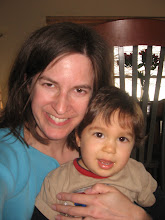John and Sarah's grandfather brought them a book about Noah, "a righteous man," who obeyed God and built the ark that would save his family and a few of each kind of animal. The story ends with the rainbow, God's promise that there wouldn't be another flood. But what about the rest of the story?
In the Bible, the last recorded incident in Noah's life tells how he got drunk and naked in his tent. One of his sons, Ham, saw Noah in this unseemly condition and told his brothers. They -- Shem and Japheth -- "took a garment, laid it on both of their shoulders, and walked backward and covered the nakedness of their father. Their faces were turned backward, and they did not see their father's nakedness" (Gen. 9:23).
I normally don't think of this part of Noah's life often. I only do now because a friend recently discovered her daughters reenacting this scene with their Polly Pockets. Hearing "drunk and naked" caught her attention.
Turns out that the girls' Sunday school teacher "got a little carried away" (his words) while telling Noah's story. He's a seminary teacher, and I guess he doesn't think the Bible needs to be sanitized for kids. (Meanwhile, another friend's daughter, after learning a Sunday school lesson from Daniel, read that passage in her Bible and asked her mother, "What's a concubine?" That part had been omitted in Sunday school. As my Old Testament professor used to say, with gusto, "The Old Testament is earthy!")
Anyway, this is probably the first time since becoming a parent that I've thought about Noah, "a righteous man," lying in his tent drunk and naked. I don't like to think of Noah in this way -- it's so, well, beneath him. But the point of the story isn't that Noah was -- surprise! -- flawed.
Ever since the fall, nakedness has been a point of shame. We don't want everything about us to be revealed -- it's not pretty. The point is that Ham was disrespectful in pointing out Noah's nakedness, while Shem and Japheth properly averted their eyes and covered him up.
Noah, consequently, curses Ham (or "Canaan," his son): "a servant of servants shall he be to his brothers" (9:25). He blesses Shem and Japheth.
We all see our parents "warts and all." No parents are perfect; what will we do with what we have observed from living in intimate quarters with them? I confess that when it comes to my own parents, I am too focused on their flaws, especially the ways that they have hurt me. But the story of Noah and his sons tells me -- it's time to move on. You know your parents' flaws: look away, and cover them up.
Subscribe to:
Post Comments (Atom)

1 comment:
What a great reminder and application! Thanks for that word today!
Post a Comment